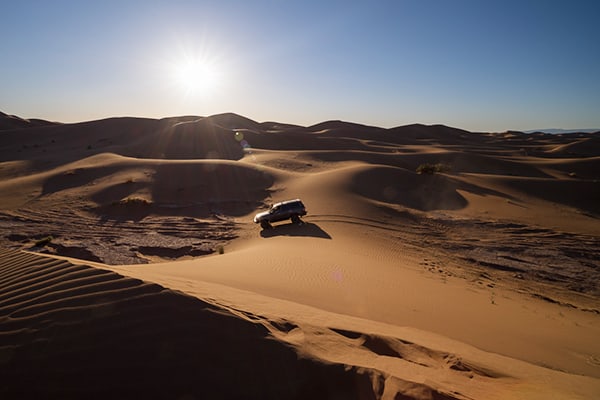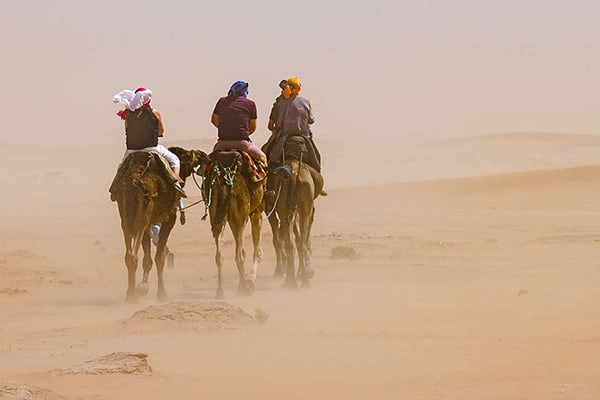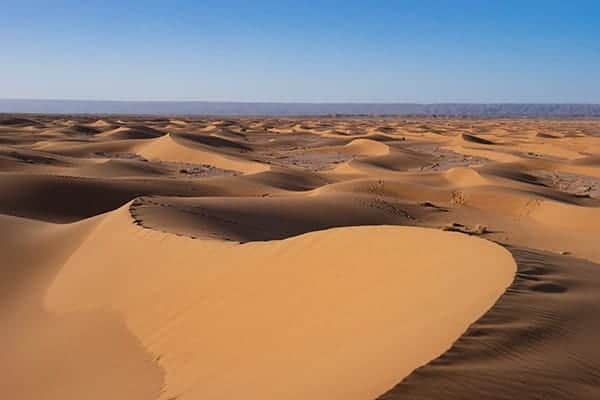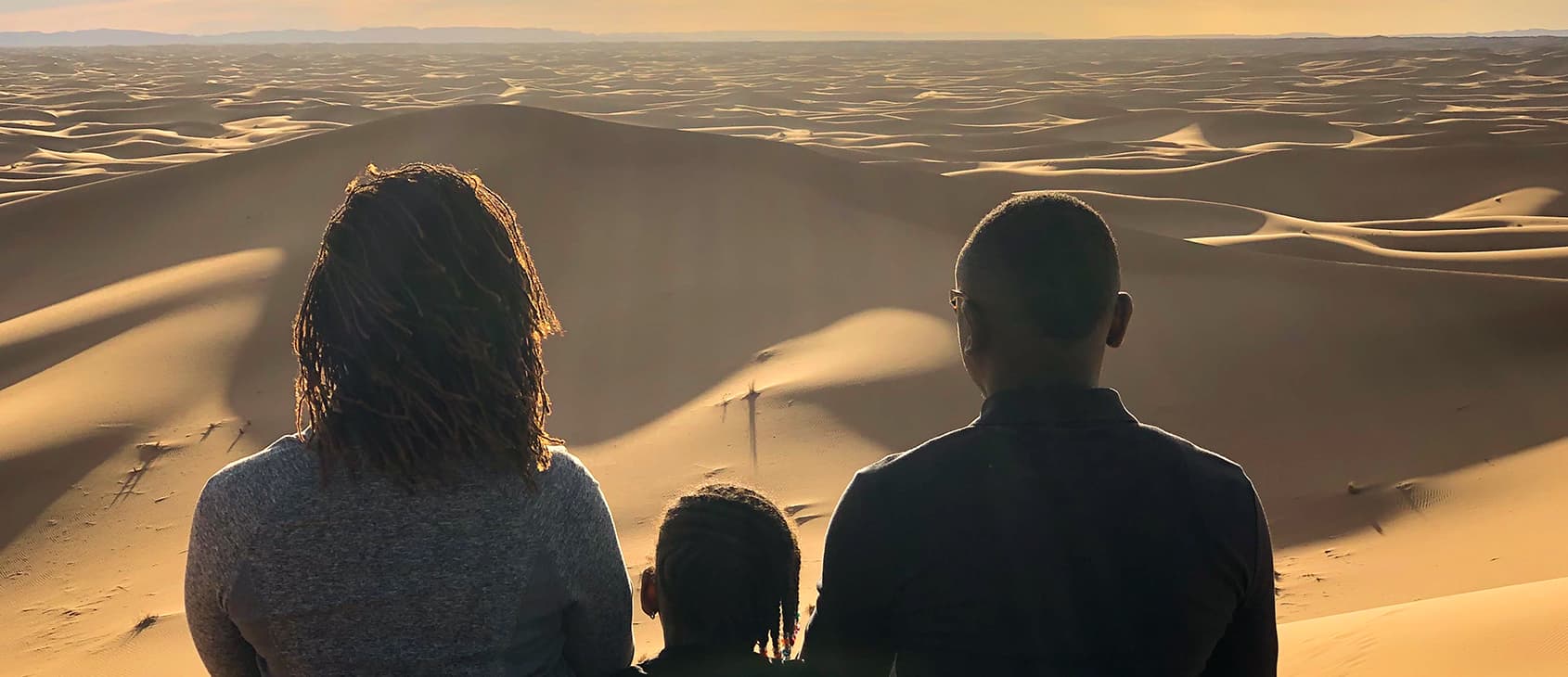Frequently asked questions
Things that are trivial and things that are important … in alphabetical order
In my opinion, the art to successful haggling is to have an idea in advance of the price. But that's easier said than done if one doesn’t have the time to do the research. Doing a transaction that is 50% to 90% off the asking price is no benchmark to a successfully concluded deal. There is also a belief that one can obtain a better price if one goes to the source of production. That might be true, provided one knows the real price. So, for example, if you wish to purchase a rug at one of the cooperatives in Taznakht (on the way back from the desert), it's a good idea to do some research in Marrakech. The cooperatives will try and get the best price possible. So it really helps to be armed with some knowledge.
Each tent has its own private en-suite bathroom. Due to the shortage of water in the desert and the fact we are 7 km from the nearest well, we operate a bucket wash system. We provide silver pewter buckets of hot and cold water, which can be replenished as often as you like. The bucket wash is a wonderful way to wash – you realise how little water one needs for an excellent wash. And it's different, which is in itself a reason for trying it. And in any case, with limited water supply and pressure, a shower is never going to replicate the quality of one in a half-decent hotel.
Sand can get everywhere – so you need to take care of your camera equipment. You are warned!
Unfortunately, it happens. Below are the terms:
- • Fully refundable if cancelled more than 30 days before your arrival date
- • 60% refundable 7 to 30 days before arrival
- • 25% refundable 0 to 7 days before arrival
The calculation is based on the total amount of the booking.
Group bookings and exclusive hire bookings (i.e. 3 or more tents) have different cancellation terms.
The road over the Atlas Mountains has quite a few bends. If you suffer from car sickness please remember to bring your motion sickness pills.
Cash is still king in Morocco. Most places prefer cash. Payments to most restaurants for small items should be in MAD. Expensive items (e.g. rugs) can normally be paid for in euro and USD.
Cash point machinesATMs and money changing
There are plenty of ATM machines and money changers in Marrakech. There are also money changers at the airport. Cash machines also exist in most major towns. There is a withdrawal limit on most foreign cards of 2000 MAD (about 210 euro per day). For cash, money changers generally offer better rates than banks and Western Union offices. Money changers accept most major currencies, except Australian dollars.
We welcome children, but for medical reasons they must be at least 5 years old. Children love the freedom of the desert, whether it be playing in the dunes, mucking around in the camp or being spoiled by the staff.
Your driver will collect you from wherever you are staying. Given that it is not possible to reach most riads in the medina by car, your driver will coordinate with your riad the most convenient place to meet. Your riad will then accompany you to where the driver is located.
If you are staying at an Airbnb, we require the phone number of your local host. Addresses in the medina don't mean much to anyone (I have 7 different addresses for my house alone). So the best way for your driver to coordinate your collection is to call the local host. Many foreign owners provide their international number, which is not very helpful at all!
Please advise if you have any special dietary requests. We can cater for vegetarians and gluten free diets.
Our drivers drive with caution. Each trip is private. They are experienced and know the best places to stop for refreshments, places of interest and photography. Whilst we suggest a departure time, there are no fixed itineraries. Each trip is tailor-made to your preferences. The journey section of the website is worth reading in advance, and provides detailed information on what to see en route.
At the camp we have solar power. It provides lighting and you can also charge electrical devices in your tent. And no, there is not sufficient power for hairdryers.
There is an environmental impact in everything we do – driving to the desert leaves an environmental footprint. But having said that, we have a responsibility to do what we can. The power is solar, whilst we operate a bucket wash system which helps save water. Hot water is produced from a very efficient wood burning stove. Whilst we provide generous food portions, there is no wastage. However, there are still practices that concern me. We provide drinking water from plastic bottles, and I am grappling to find a suitable alternative that guests also find safe (although we do try and re use the bottles for other things). On a positive note, Morocco is becoming more aware. Marrakech has recently installed a large recycling plant for its waste. But rural areas still burn most of their rubbish. Whilst we are doing what we can to minimize the impact on the environment, it’s a challenge that will be ongoing for several years.
The road from Marrakech to Essaouira has been upgraded, and it now takes about 2h30. Essaouira has a tranquil medina and a wide and wild beach. Essaouira can be quite windy (ideal for kite surfing) although in fine weather you can chill out, the beach is really more suitable for walking, running, horse riding and recreational activity. Our recommended places to stay are Villa de l’Ô (colonial style rooms and an excellent roof terrace) and the ancient and quirky Villa Maroc.
30 km south from Essaouira is Sidi Kaouki, which is a throwback to the old days. It’s wild, windy, rustic, with a wide, long empty beach. We recommend Rebali Riads.
The Private Camp which has 4 tents (although we can construct an extra tent if required) is a beautiful venue for exclusive hire for family and friends. It is located 15 minutes from the main camp in a delightfully serene setting. The service provided is the same as the main camp.
We also have a new camp, the Private Nomadic Camp, which has just one tent and is perfect for honeymooners and for those seeking complete privacy. It can also be used as a base for those who would like to trek. At this camp we provide very discreet service, with a chef and one other person. It has an amazing location with your own private range of dunes.
Fez is a jewel. Its medina is ancient, almost mediaeval in feel. It's crazy, chaotic, intense, and totally beguiling. It's 7 hours by train, 5h30 by car, but the easiest way is to fly. There are 3 direct flights per week with Air Arabia. There is also a flight on Friday from Zagora (3 hours from the camp) via Casablanca. From Fez you can also take a day trip to the excellently preserved Roman town of Volubilis, combined with a trip to Meknes. The much photographed town of Chefchaouen (which used to be a delightful backwater) is 3h30 from Fez.
Food served is Moroccan. Hence expect to see plenty of tajines, salads and couscous. Most of the ingredients are sourced locally, so the food is very fresh. Breakfast is more international, with tea, coffee, fresh orange juice, muesli, eggs, cheeses, and yogurts offered. There is no fish, other than some errant tinned tuna.
If you would like to have a guide in Marrakech, this can normally be arranged directly through your riad or hotel. We do know a limited number of guides who provide a good service and won't take you shopping, but they normally need to be booked well in advance.
The sun is hot all year. So please drink plenty of water, and protect your sensitive skin.
Marrakech, Casablanca, Rabat and Fez have good hospitals. However, the medical facilities outside these major cities is at best adequate. Travelling to the desert and remote areas is inherently more risky.
No vaccinations are required for Morocco.
There are no mosquitoes in the desert. Depending on the time of year there are flies during the day, but they thankfully disappear at night.
We strongly recommend that you take out your own medical and evacuation insurance.
There are increasingly more flight options. There are flights twice per week with Air Arabia from Marrakech to Zagora (3 hours from the camp). There are also flights 3 times per week with Air Arabia from Marrakech to Fez. And there are flights four times per week from Zagora to Casablanca, of which one (on Friday) continues to Fez. A good option is to fly one way and drive the other. See Commercial flights for more information.
Ait Benhaddou is by far the most well known ksar en route to the desert. It's a UNESCO heritage site. It's a popular place to visit. However, savvy travellers also seek out the places that are somewhat less hyped. There are hundreds of ancient kasbahs en route – which are equally as interesting, although perhaps not as well preserved. This include the magnificent Telouet Kasbah in the Ounila Valley, which has some well preserved zellij and stucco work. Other places en route are Tamnougalt near Agdz, Kasbah Oulad Othmane halfway between Agdz and Zagora and an easy stopping off point, and Ouled Driss near M'Hamid. Families still live in most of these kasbahs.
At the camp we provide lunch. This can be taken at the camp, although we often, especially in the warmer months, take lunch in a shaded area, 45 minutes from the camp.
Beware of the accuracy of Google Maps. The driving times are inaccurate and predict an average speed that is not attainable. In the medina of Marrakech, Google Maps provides a rough indication of where to go, but riads are often shown as being located in the wrong place. There are some good maps of the medina, and wherever you stay should provide you with one.
Morocco is full of the quintessential palm oasis. The Draa River is one long oasis, with 30 different varieties of palm trees. M´Hamid, the entrance to the desert, also has a verdant oasis. In the desert itself there is less water, and the oases are much smaller. By definition an oasis is a place of water. The shaded and tranquil area we take you for lunch, is a tamarisk oasis, this being the local evergreen tree, that makes a mesmeric whistling noise in the wind. There is also a small organic farm here.
In most cases (i.e. from US, Europe and most of Central and South America), passports only need to be valid for the length of time you wish to stay in Morocco. However, the passports of Australian and Canadian passport holders must be valid for six months. Some countries still require visas, so if in doubt contact your local Moroccan embassy.
Payment can be made by bank (wire) transfer, PayPal (although there is a 3% fee) and cash at the camp. We can accept credit cards, but the card has to be inserted into the card reader and therefore the transaction can only be done in Marrakech.
At the camp, the Orange network works well. All hotels and guest houses have Wi-Fi, some better than others. You can access Wi-Fi through your driver's hotspot. There is also, on occasions, Wi-Fi at the camp, although it only works at the bar and is not always guaranteed to function! You can purchase a Moroccan SIM at one of the news kiosks in the new town of Marrakech (called Gueliz).
Ramadan in 2024 is approximately from 10 March to 10 April. Most places function as normal, although are closed in the evening when they break fast. During the day fewer restaurants are open. Given that Muslims abstain from drinking and eating, a degree of empathy is required!
There is an eclectic mix of establishments, Moroccan and French. Some are in the medina and some in the new town of Gueliz. In most restaurants smoking is allowed, which can be awful.
Download our restaurant guide.
Driving 60 km off-road on random tracks and soft sand is an adventure in itself. But in a sandstorm, where visibility can be virtually zero, you will marvel at the navigational expertise of your driver. It's all part of the adventure of visiting Erg Chigaga. It is NOT a mainsteam vacation, and the unexpected must be expected. Sandstorms can occur at any time, but they come and go, and can stop as quickly as they start.
If you have a suitable 4WD (e.g. Toyota Land Cruiser or Mitsubishi Pajero Sport), you can self-drive to the camp. It's great fun, although some skill and common sense is required. You do however require a guide, which we would organise for you. The camp is difficult to find at the best of times, but in a sandstorm requires a local expert. Whilst GPSs can be helpful, they do not point out unseen hazards, of which there are plenty. The guide costs 50 euro for a return trip to M'Hamid and 80 euro if exiting the desert via Foum Zguid.
If you rent a normal sedan car you can drive to M'Hamid, and from there we would collect you in a 4WD. If staying 2 nights at the camp it costs 300 euro for the return trip and the vehicle is also available for your use whilst in the desert.
It's not compulsory. However, if you would like to leave a tip a fair amount for the driver is 15 to 20 euro per day, and for the camp 20 euro per couple per day. For the camp please give the cash to Bobo or Bachir.
It is undoubtedly a logistical challenge to fit all the things you want to do into your schedule. I feel that I am now something of an expert in making the trip as logistically efficient as possible. So, please do not hesitate to ask if you would like any help.
Whilst most guests take a 4WD with a driver, it is possible to rent a vehicle. You can rent a normal sedan car from one of the larger agencies. If renting a 4WD the best agency is probably Medloc, although Hertz is also OK. Please note that the best 4WD for the desert is a Toyota Land Cruiser (Prado model). The 4WD needs to have high clearance, and be rugged. Although vehicles like Dacia Dusters and small Cherokees are marketed as 4WDs they are not suitable for the desert. They neither have the ground clearance or rugged capability to cope with the desert.
The desert is a place of extremes. During the day the temperature is from 18º to 22º Celsius from December to February, 20º to 25º March and November, 24º to 32º April and October, 30º to 38º in May and September and ridiculouly toasty from June to August. Conversely at night it is normally pleasantly warm from April to October, but from November to March it is cool and nearly freezing over Christmas and New Year. We have an endless quantity of hot water bottles, very warm duvets and blankets to keep you warm though.
Marrakech is reasonably relaxed. It is advised though, out of respect, that women cover their shoulders and dress reasonably modestly. Shorts, skirts, and t-shirts are fine.
For all seasons, have good training shoes, hat, sunglasses. In winter (November to March) you need a pullover and something to keep you warm in the evenings and at night.

4WD - essential transport

Setting off during a sandstorm

Magnificent dunes of Erg Chigaga

